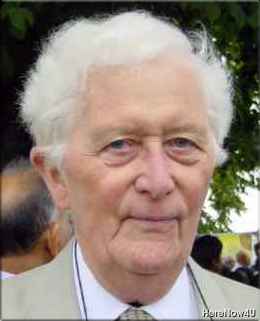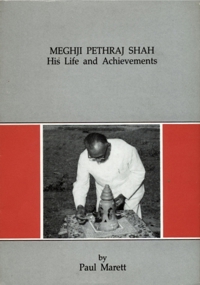
Dhebarbhai, (Chief Minister of Saurashtra when Meghjibhai returned to India and ex-President of the Indian National Congress) recalls his early contacts with Meghjibhai:
'When Premchandbhai told me that Meghjibhai was to retire from business and come to Saurashtra I was astonished. By his own efforts he had risen from a humble position to become a rich man. I believed that if a man of his worth continued in business, the business world as well as the common people would benefit. Ever since we heard of his arrival Manubhai (the Finance Minister) and I were eager to meet him. Premchandbhai and Hemchandbhai were the links between Meghjibhai and myself. At Hemchandbhai's suggestion I called to see Premchandbhai at his house in Jamnagar. Hemchandbhai had informed me that Meghjibhai knew not only how to make money but also how to spend it. He had also heard it hinted that Meghjibhai had come to Saurashtra with a view to making donations. But how could one even imagine that a single individual would generously offer such huge donations?'
Dhebarbhai goes on:
'We found that Hemchandbhai's opinion about Meghjibhai was true. Manubhai had numerous plans for the development of Saurashtra and he hoped to get financial help from Meghjibhai for several institutions of Saurashtra. But Premchandbhai informed us that Meghjibhai had something else in mind. Meghjibhai was interested in opening his treasure for solving the most difficult problems of the regions of the new Saurashtra State. According to him, Saurashtra was backward in respect of education and medical facilities.'
He relates the crucial meeting with Meghjibhai:
'Our discussions began at eleven. Manubhai went on explaining the plans of the government of Saurashtra. Meghjibhai went on accepting the plans, which he found to be sound and consistent with his own ideas that one holds property in trust for humanity. It was the policy of the government of Saurashtra to accept the plans and donations of a donor who was ready to undertake half the expenditure. Meghjibhai even had statistics about the rural backward regions of Jamnagar. It was he who said that Saurashtra needed a medical college. Within a matter of an hour, he offered donations of ten million rupees if the state government were ready to undertake half the expenditure. He wanted to make a definite timetable to fulfil the plan. With his own enthusiasm Manubhai helped. As a result of Meghjibhai's clear and practical approach the plan for expenditure of ten million rupees had been drawn up in detail before lunchtime. On leaving, Meghjibhai expressed the hope that there was in the State of Saurashtra a group of people who believed in doing sound work and he said that he would wholeheartedly work with such a group.'
Shri Dhebarbhai continues his memories of Meghjibhai:
‘All will remember Meghjibhai as a great donor. More valuable than his donations of crores of rupees were his humility and nobility. In view of the needs of the region and people, he donated, and donated freely, so that the fulfilment of the plans might not be obstructed. He never donated in the hope of getting any return. He aimed at being a greatly admired businessman like Tata [head of one of the greatest industrial and commercial groups in India]. He too adopted the high ideal of trusteeship, which Tata did. It was time and co-operation that he needed. Co-operation he did get but it was not equal to his expectation. Neither did he have the time to develop his plans of service through the medium of business and industry before death called him from amongst us'.
Even when donations of small amounts are involved, many wealthy people are inclined to hesitate and make promises. There are some who make promises but do not keep them. There are some who attach a large number of conditions to their donations. They try to gain a considerable reputation by donating many small amounts. They assume proudly that they have put others under a great obligation by donating their money. Meghjibhai was nothing like this. He was an extraordinary person who could unselfishly make over millions of rupees for the public benefit. One who offers millions of rupees for the welfare of the motherland commands our respect.
The rapidity with which a large number of new institutions were founded with the financial aid of Meghjibhai' s Trust was almost miraculous and in the year 1954 it seemed as though there was hardly a single day when the newspapers did not carry the news of the laying of the foundation stone of a new institution endowed by him at one place or another. Impressed by Meghjibhai' s generosity, His Highness Jamsaheb, the Raj Pramukh (Governor) gave him the nickname 'Jagdusha' and people compared Meghjibhai with Bhamasha. These are the names of almost legendary donors in Indian history and show the great respect in which Meghjibhai was held.
C.P. Shah has already been mentioned. When he was appointed manager of the London branch of the Bank of Baroda, Meghjibhai had already settled in London and they came into close contact again. Shri C.P.Shah saw something of Meghjibhai's ability and selfless generosity at first hand. His reminiscences are worth recording.
C.P. Shah's birthplace was Kadi, in the north of Gujarat. Two colleges, of arts and commerce, were being established there and some of the people connected with the project asked Meghjibhai whether he would donate 100,000 rupees. The project had already raised about 50,000 rupees. Meghjibhai normally insisted on setting up new institutions rather than give money to those, which had already been established by others. However, he was sympathetic and the solution, which he worked out, provided a most satisfactory compromise. He proposed that an education society should be established in Kadi and that the two colleges should be linked to the society. The practical scheme was acceptable to both parties. Meghjibhai was always willing to help educational institutions and in response to the appeal for 100,000 rupees he actually gave 125,000. As a result the Shri M.P. Shah Education Society came into existence in Kadi in 1962-63. Dr. Paul Marett
Dr. Paul Marett

